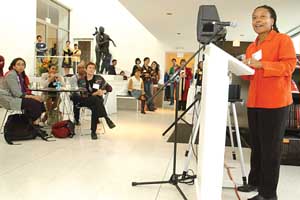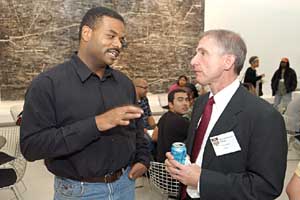PIMI report guides OMSA in refocusing mission to better serve students
By Josh SchonwaldNews Office
 Cathy Cohen welcomes students back to at the OMSA event.  Richard Saller, Provost (at right), talks with Warren Chain, a third-year student in the Divinity School, at the Thursday, Oct. 7 OMSA Welcome Back event at the Smart Museum of Art. | |
Responding to an ongoing sweeping evaluation of student needs, the University has revamped the Office of Minority Student Affairs as an important first step toward improving the quality of services provided to students of color.
More than 150 students, faculty and staff attended OMSA’s first annual Welcome Back event Thursday, Oct. 7, at the Smart Museum. At the event, Steve Klass, Vice President and Dean of Students in the University, and Richard Saller, Provost of the University, introduced the interim co-directors of the newly structured OMSA, explained its goals and defined its mission, which is based, in part, on recommendations from the committee structure called the Provost’s Initiative on Minority Issues.
Housed in the Administration building, OMSA is currently co-directed by Cheryl Bradley-Stone and Linda Choi, Special Assistants to the Vice President and Dean of Students for Minority Affairs. The reorganized office will receive expanded resources, Klass said, and it will mainly focus on student services and support. “We had collected a tremendous amount of information from students,” said Klass. “And what we’ve concluded is that the mission of the office was just too diffuse and was not meeting the needs of its primary constituency.”
Formerly, OMSA managed the Summer Research Opportunities Program, an academically focused program for undergraduate students of color, which now will be overseen by the Office of the Dean of Students in the College. “Since SROP is an academic program, we felt it would be administered more effectively in an office that is intrinsically closer to the academic mission of the institution,” said Klass. The Office of the Dean of Students in the College also administers the Mellon Mays Undergraduate Fellowship program. While these programs differ from one another in mission and structure, “they share basic academic elements, and we feel that both programs and the students they serve will benefit by being managed in the same office,” Klass said.
Moreover, the movement of SROP will give clarity to OMSA’s focus on advocacy for students through the creation of a greater number of social and community-building events and increased collaboration with other offices on campus. OMSA will function as the central clearinghouse for information about programs and services of particular interest to students of color, Choi said.
Already the restructured office has made steps to improving its communications with students and visibility on campus. A revision of “Voices of Our Community: A Resource Guide,” and a new publication, “Mentoring Across Campus,” as well as a revamped and still-evolving Web site (http://omsa.uchicago.edu) debuted earlier this summer. OMSA co-sponsored multicultural-themed summer gatherings in three cities, attracting more than 200 alumni and students, and conducted “diversity training” workshops for Orientation aides. The office also sent out an inaugural Welcome Kit for incoming first-years.
“Our goal is to give students a sense of belonging so they don’t feel isolated or alone,” Bradley-Stone said. Both Choi and Bradley-Stone said one of their most satisfying experiences to date came after an Orientation Week event for students of color who are entering their first year. “An African-American parent came up to us and said that he was so relieved to see that we (OMSA) were here,” said Bradley-Stone. “That’s exactly why we’re here. We want them to know that there is a community.”
OMSA also is in the process of revamping a community space. The Amandla Center, the multicultural student resource center that opened in Harper Memorial Library in January 2003, has been redecorated with photos from cultural student organizations and is being stocked with additional resource materials. Both Bradley-Stone and Choi expect the space will become an increasingly popular gathering spot for student organizations and individual students seeking informal community space in which they can just hang out.
Another important goal of OMSA is to collaborate more with other campus offices. In particular, Bradley-Stone and Choi plan to work closely on event programming with the Center for the Study of Race, Politics and Culture. A monthly lecture will kick off next month.
The reorganization of OMSA is, in large part, the outgrowth of a subcommittee on the PIMI evaluation, which focused on student programming and support. The complete PIMI annual report will be released later this quarter, Klass said.
“We are committed to improving the overall campus experience for our students and to improving the University’s ability to both recruit and retain students of color,” Klass said. “This is an institution that has had a wonderful history of inclusiveness, and we need to reclaim it. This is a critically important first step in a number of ways.”
![[Chronicle]](/images/sidebar_header_oct06.gif)